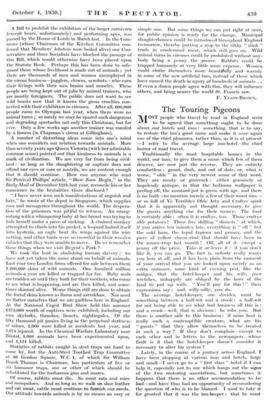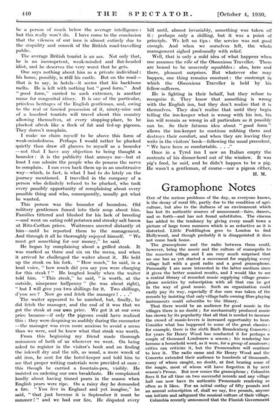The Touring Pigeons
-Ill-OST people who travel by road in England seem to be agreed that something ought to be done about our hotels and inns : something, that is to say, to restore the inn's good name and make it once again one of the chief pleasures, rather than, as it is at present —I refer to the average large inn-hotel—the chief horror of road travel.
Traditionally the most hospitable houses in the world, our inns, to give them a name which few of them deserve, are now just the reverse. They are entirely comfortless : gaunt, drab, and out of date, or, what is worse, " olde " in the very newest sense of that word. They are musty or gimcrack : either genuinely or hopelessly antique, in that the bedroom wallpaper is peeling off, the mustard-pot is green with age, and there is no bath—to mention merely a few of their worst sins— or so full of Ye Terriblye Olde Arty and Craftye spirit that it is apparently not thought necessary to give the guests anything else for their money. The food is certainly olde : often it is craftyc, too. Those craftye olde potatoes ! Those five shilling "dinners " at which, if you arrive ten minutes late, everything is " off " but the cold ham, the tepid tapioca and prunes, and the piece of yellow cheese-rind that should have been in the mouse-trap last month ! Off, all of it—except a penny off the price. Take it or leave it : if you don't like it, you can go. The fact is, nobody really wants you here at all, and it has been plain from the moment Of your arrival that you are looked upon merely as an extra nuisance, some kind of evening pest, like the midges, that the hotel-keeper and his wife, poor wretches, unhappily are obliged by the laws of the land to put up with. " You'll pay for this I " their expressions say : and, willy-nilly, you do.
The average hotel-keeper, one decides, must be something between a half-wit and a crook : a half-wit for not being able to see what bad business all this is : and a crook—well, that is obvious : he robs you. But there is another side to this business : if mine host is really such a contemptible creature, what arc his guests " that they allow themselves to be treated in such a way ? If they don't complain—except to each other and in letters to the newspapers—whose fault is it that the hotel-keeper doesn't consider it necessary to alter his system ?
Lately, in the course of a journey across England, I have been stopping at various inns and hotels, large and small—I never go to a "first class" hotel if I can help it, especially not to one which hangs out the signa- of the two motoring associations, but sometimes it happens that there is no other accommodation to be had—and have thus had an opportunity of reconsidering the question of who is to be blamed. I used to take it for granted that it was the inn-keeper : that he must
be a person of much below the average intelligence : but this really won't do. I have come to the conclusion that the vileness of our inns is almost entirely due to the stupidity and conceit of the British road-travelling public.
The average British tourist is an ass. Not only that, he is an incompetent, weak-minded and flat-headed - idiot, and he deserves the very worst that he gets.
One says nothing about him as a private individual : his home, possibly, is still his castle. But on the road— that is to say, in hotels—it seems that his backbone melts. He is left with nothing but "good form." And "good form," carried to such extremes, is another name for congenital idiocy. It is one of the particular, priceless heritages of the English gentleman, and, owing to the real or fancied possession of it, ninety-nine out of a hundred tourists will travel about this country allowing themselves, at every stopping-place, to be plucked afresh like a flock of fat and fed-up pigeons. They daren't complain.
I make no claim myself to be above this form of weak-mindedness. Perhaps I would rather be plucked quietly than draw all glances to myself as a bounder —not that I have any objection to being thought a bounder: it is the publicity that annoys me—but at least I can admire the people who do possess the nerve to complain. I can even back them up in an unobtrusive way—which, in fact, is what I had to do lately on the journey mentioned. I travelled in the company of a person who definitely refused to be plucked, who took every possibly opportunity of complaining about every possible thing and who, consequently, usually got what he wanted.
This person was the bounder of bounders. Old military gentlemen fumed into their soup about him. Families tittered and blushed for his lack of breeding —and went on eating cold potatoes and streaky salt bacon at Ritz-Carlton prices. Waitresses sneered distantly at him—until he reported them to the management. And through it all he thoroughly enjoyed himself. "We must get something for our money," he said.
He began by complaining about a grilled steak. It was marked as three and six on the menu, and when it arrived he challenged the waiter about it. He held up the steak on his fork. "How much," he said, in a loud voice, "how much did you say you were charging for this steak ? " He laughed loudly when the waiter told him. "This steak," he said, "is worth, at the outside, ninepenee halfpenny" (he was about right), "but I will give you two shillings for it. Two shillings, d'you see ? Now go and fetch the manager . . ."
The waiter appeared to be numbed, but, finally, he did fetch the manager, and the end of it was that we got the steak at our own price. We got it at our own price because—if only the pigeons could have realized this : they were despising us audibly during the encounter —the manager was even more anxious to avoid a scene than we were, and he knew what that steak was worth.
From this beginning my friend made thorough nuisances of both of us wherever we went. On being asked to register in the visitor's book and on finding the inkwell dry and the nib, as usual, a mere wreck of old iron, he sent for the hotel-keeper and told him to see that proper writing materials were provided at once : this though he carried a fountain-pen, visibly. He insisted on ordering our own breakfasts. He complained loudly about having tinned pears in the season when English pears were ripe. On a rainy day he demanded a fire. "You live in England and yet imagine," he said, "that just because it is September it must be summer I and we had our fire. He disputed every
bill until, almost invariably, something was taken off it : perhaps only a shillind, but it was a point of principle. We left no tips : the service was not good enough. And when we ourselves left, the whole management sighed profoundly with relief.
Well, that is only a mild idea of what happens when one assumes the role of the Obnoxious Traveller. There are bound to be unseemly squabbles : also, here and there, pleasant surprises. But whatever else may happen, one thing remains constant : the contempt in which the Obnoxious Traveller is held by his fellow-sufferers.
He is fighting in their behalf, but they refuse to recognize it. They know that something is wrong with the English inn, but they don't realize that it is themselves. They don't realize that until they begin telling the inn-keeper what is wrong with his inn, his inn will remain as wrong in all particulars as it possibly can be. So their fatuous idea about "good form" allows the inn-keeper to continue robbing them and destroys their comfort, and when they are leaving they write in the visitors' book—following the usual precedent, "We have been so comfortable. . . ."
Once in a Tyrol inn I saw an Italian empty the contents of his dinner-bowl out of the window. It was pig's food, he said, and he didn't happen to be a pig. He wasn't a gentleman, of course—nor a pigeon either.,
H. M.





















































 Previous page
Previous page